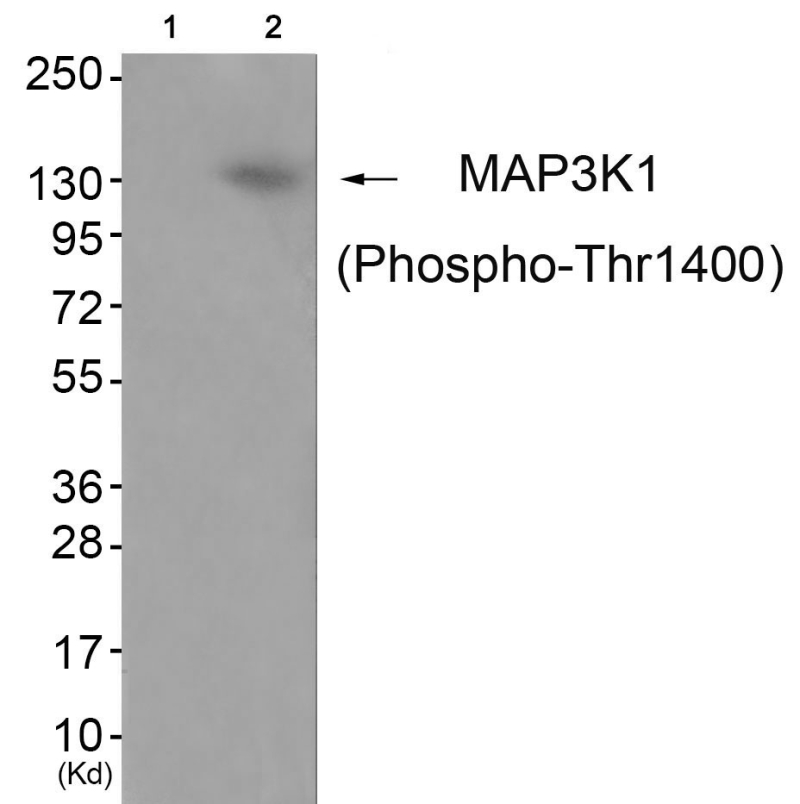

| WB | 咨询技术 | Human,Mouse,Rat |
| IF | 咨询技术 | Human,Mouse,Rat |
| IHC | 1/50-1/100 | Human,Mouse,Rat |
| ICC | 技术咨询 | Human,Mouse,Rat |
| FCM | 咨询技术 | Human,Mouse,Rat |
| Elisa | 咨询技术 | Human,Mouse,Rat |
| Aliases | M3K1; MAP3K1; MAPKKK1; MEKK1; |
| Entrez GeneID | 4214; |
| WB Predicted band size | 130kDa |
| Host/Isotype | Rabbit IgG |
| Antibody Type | Primary antibody |
| Storage | Store at 4°C short term. Aliquot and store at -20°C long term. Avoid freeze/thaw cycles. |
| Species Reactivity | Human |
| Immunogen | Peptide sequence around phosphorylation site of threonine 1400(K-G-T(p)-G-A) derived from Human MAP3K1. |
| Formulation | Purified antibody in PBS with 0.05% sodium azide. |
+ +
以下是关于MAP3K1 (Phospho-Thr1400)抗体的3篇参考文献,基于公开学术资源整理:
---
1. **标题**:*MAP3K1 Phosphorylation at Thr1400 Regulates Cutaneous Vascular Development*
**作者**:Zhang Y et al.
**摘要**:本研究揭示了MAP3K1在血管生成中的作用,通过Thr1400磷酸化调控下游ERK信号通路。实验使用Phospho-Thr1400特异性抗体进行免疫印迹分析,证实该位点的磷酸化对小鼠胚胎血管发育至关重要。
---
2. **标题**:*Phosphorylation-Dependent Interaction of MAP3K1 with 14-3-3 Proteins in Breast Cancer*
**作者**:Lee S et al.
**摘要**:文章探讨了MAP3K1 Thr1400磷酸化与乳腺癌细胞迁移的关系。作者利用Phospho-Thr1400抗体进行免疫共沉淀实验,发现磷酸化MAP3K1与14-3-3蛋白结合增强,促进肿瘤侵袭性。
---
3. **标题**:*A Signaling Switch Controlled by Thr1400 Phosphorylation of MAP3K1*
**作者**:Johnson RA et al.
**摘要**:研究通过体外激酶实验和Phospho-Thr1400抗体的应用,证明Thr1400磷酸化是MAP3K1激活的关键步骤,调控JNK/p38通路并影响细胞凋亡与增殖平衡。
---
**备注**:若需具体文献来源,建议通过抗体供应商(如CST #12590)的产品页面获取引用文献,或在PubMed中搜索上述关键词筛选最新研究。部分文献可能需要通过机构访问权限获取全文。
The MAP3K1 (Phospho-Thr1400) antibody is designed to detect the phosphorylation of mitogen-activated protein kinase kinase kinase 1 (MAP3K1) at threonine residue 1400. MAP3K1. a serine/threonine kinase, plays a pivotal role in regulating multiple signaling pathways, including the JNK, ERK, and NF-κB cascades, which are critical for cellular responses such as proliferation, differentiation, apoptosis, and stress responses. Phosphorylation at Thr1400 is associated with the activation or modulation of MAP3K1 kinase activity, often triggered by extracellular stimuli like cytokines, growth factors, or cellular stress. This post-translational modification serves as a regulatory mechanism, influencing downstream signaling events and crosstalk between pathways.
The antibody is widely used in research to investigate MAP3K1 activation dynamics in physiological and pathological contexts, such as cancer, immune regulation, and developmental processes. It is commonly applied in techniques like Western blotting, immunoprecipitation, and immunohistochemistry to assess phosphorylation-dependent signaling states. Validation typically includes testing in knockout cell lines or samples with known activation status to ensure specificity. Researchers utilize this tool to explore how MAP3K1-mediated signaling contributes to disease mechanisms or therapeutic targets, particularly in oncology, where aberrant MAP3K1 activity is linked to tumor progression and drug resistance. Proper controls are essential to distinguish phosphorylation signals from total protein levels.
×